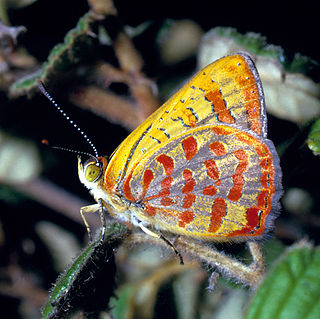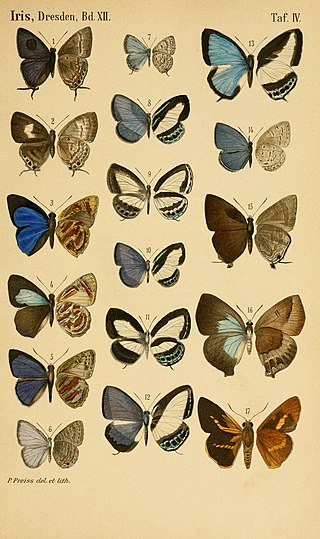
The Luciini are a tribe of butterflies in the family Lycaenidae.

Hypochrysops is a genus of butterflies in the family Lycaenidae first described by Cajetan Felder and Rudolf Felder in 1860. This particular genus is exclusive to the Australian area with only a few species straying into Papua New Guinea.

Alphitonia excelsa, commonly known as the red ash or soap tree, is a species of tree in the family Rhamnaceae. It is endemic to Australia, being found in New South Wales, Queensland, Northern Territory and the northeastern tip of Western Australia. It is used in bush regeneration as a pioneer species and for amenity planting.

Hypochrysops narcissus, the Narcissus jewel, is a member of the family Lycaenidae of butterflies.

Hypochrysops epicurus, the dull jewel, is a butterfly of the family Lycaenidae found in Australia.

Hypochrysops byzos, the yellow-spot jewel, is a member of the family Lycaenidae. Its range consist of eastern Australia. The wingspan of both the male and female is about 3 cm.

Titea is a genus of butterflies in the family Lycaenidae.

Myrmecodia beccarii, ant-house plant, is an epiphytic plant on Melaleuca trees and others with spongy bark in the wetlands and mangroves of tropical north Queensland, Australia from Cooktown to Mission Beach. The prickly, swollen stems develop natural hollows which are invaded by the golden ant in a symbiotic arrangement. The ants patrol the plant, removing leaf-eaters, while their excreta is absorbed by the plant for nutrition.

Dendrophthoe vitellina, commonly known as long-flowered- or apostle mistletoe, is a hemiparasitic plant of the mistletoe family Loranthaceae. The genus Dendrophthoe comprises about 31 species spread across tropical Africa, Asia, and Australia. Despite being collected by Joseph Banks and Daniel Solander in 1788, and depicted in Banks' Florilegium, it was not until 1860 that it was described by Ferdinand von Mueller as Loranthus vitellinus after being collected near Ipswich, and renamed by Philippe Édouard Léon Van Tieghem in 1895.

Hypochrysops dinawa is a species of butterfly of the family Lycaenidae. It is found from southern New Guinea to Papua New Guinea.

Hypochrysops resplendens is a species of butterfly of the family Lycaenidae. It is found on Aru.

Hypochrysops delicia, the moonlight jewel, is a member of the family Lycaenidae. It is found in eastern Australia.

Hypochrysops pagenstecheri is a butterfly of the family Lycaenidae endemic to New Britain. The name honours Arnold Pagenstecher.

Hypochrysops architas is a butterfly of the family Lycaenidae endemic to the Solomon Islands. It was first described by Hamilton Herbert Druce in 1891.

Muellerina celastroides, common names Banksia mistletoe and coast mistletoe, is a hemiparasitic aerial shrub in the family Loranthaceae. The species is endemic to New South Wales, Victoria and Queensland.












